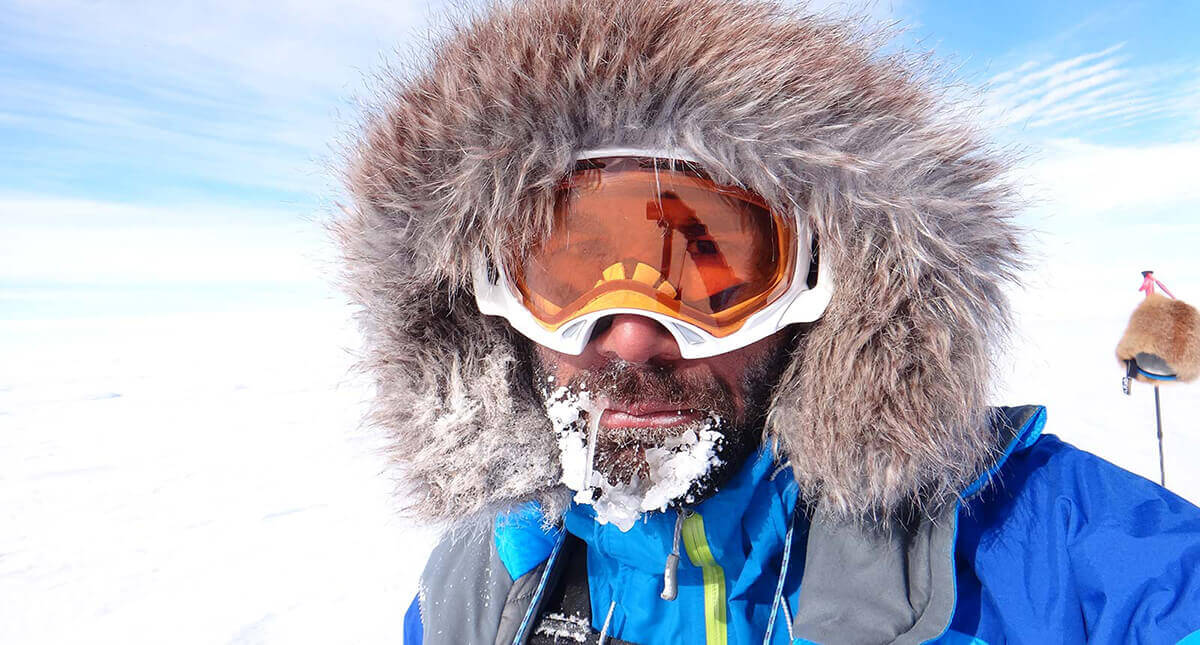He reached the South Pole today at 5.24am GMT, 2.24am Chilean time and 6.24pm local NZ time, completing the 1150km/715m solo journey from the geographical coastline of Antarctica in 29 days, 19 hours and 24 minutes, setting a new British record and recording the second fastest time in history. He also became the first ever Welsh person to complete a solo, unsupported and unassisted journey to the South Pole.
Richard has taken just under 10 days off the existing British record, held by polar explorer Hannah McKeand, who in 2006 reached the pole in 39 days, 9 hours and 33 minutes.
After skiing a total of 366 hours, 1150km/715miles in 29 days and burning the calorific equivalent of two marathons a day completely alone, a weary, but very happy Richard arrived at the South Pole stating; “I’m exhausted. Physically I am absolutely shattered, mentally I am frazzled, it is just a lot to take in. I have a lot of emotions bouncing around but I am happy, proud and grateful.”
He added that the final few kilometres approaching the Geographical South Pole marker and Amundsen-Scott South Pole Station were just as tough as the previous 715 miles; “I could see the station and I was only about 3km away and I literally was having to talk myself out of pitching my tent with every step, I just didn’t think I could put another foot in front of the other.”
He has had to show immense mental and physical stamina to complete this solo journey, particularly after having to start his expedition all over again after he was forced to turn back following 3 days of skiing in whiteouts and terrible conditions, which put the whole expedition in jeopardy. He turned around, skied a further 3 days back to his start point at Hercules Inlet, waited for more favourable conditions and started his attempt all over again. He also skied the last two days of his journey with a broken ski.
Trying to sum up his achievements, Richard finally added; “I felt quite overwhelmed in the last steps getting to the South Pole marker. So many emotions were bouncing around in my body. It was not quite the script that I had planned but I was full of gratitude and pride because I know what I achieved is special. I skied to the marker, took a few minutes just to savor it and take it in, it will probably take a lot longer than that, I will probably be reflecting on this for some quite time.”
SOLO SOUTH POLE JOURNEY FACTS:
Only 30 people (including Richard) have skied solo to the South Pole in history and only 19 (including Richard) have skied the purest form of solo, unsupported and unassisted without any help from kites or resupplies. He started his solo journey on 5th December from Hercules Inlet, the recognised start point on the geographical coastline of Antarctica for solo expeditions to the South Pole.
Richard has become the 19th person to ski solo, unassisted and unsupported to the South Pole and has recorded the fastest solo journey to the South Pole by a Brit in history. As far as records show, Richard has become the first ever Welsh person to ski solo, unsupported and unassisted to the South Pole.
In polar terms, the purest definition of skiing solo means unsupported and unassisted, without the help of mechanical support or re supplies. The style label “solo” requires that the explorer is alone and receives no outside assistance. A solo performance thus requires the assist label “unassisted”.
The first ever solo journey to the South Pole was recorded by Norwegian Erling Kagge from Berkner Island in 1993 in 50 days. The first ever solo journey from Hercules Inlet was by Norwegian Liv Arnesen in 1994. She was also the first woman to ski solo and unsupported to the South Pole, she completed the journey in 50 days.
Out of the now 30 Antarctic solo journeys recorded in history, some have taken shorter routes from the recognised start point of Hercules Inlet to which all modern records are gaged and compared, and some have used kites to assist their journeys or had re-supplies. Only 19 journeys (included Richard) have skied the purest form of solo expeditions, skiing solo, unsupported and unassisted and there has been only 15 (including Richard) solo, unassisted and unsupported journeys to the South Pole from the Hercules Inlet start point.
